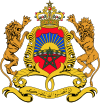You can help expand this article with text translated from the corresponding article in French. (April 2021) Click [show] for important translation instructions.
|
Abbas El Fassi | |
|---|---|
عباس الفاسي | |
 El Fassi in 2008 | |
| 14th Prime Minister of Morocco | |
| In office 19 September 2007 – 29 November 2011 | |
| Monarch | Mohammed VI |
| Preceded by | Driss Jettou |
| Succeeded by | Abdelilah Benkirane |
| Secretary-General of the Istiqlal Party | |
| In office 1998 – 23 September 2012 | |
| Preceded by | Driss Jettou |
| Succeeded by | Hamid Chabat |
| Personal details | |
| Born | 18 September 1940 Berkane, French Morocco |
| Political party | Istiqlal Party |
Abbas El Fassi (/əˈbæs ɛl ˈfæsi/ ⓘ; Arabic: عباس الفاسي; born 18 September 1940) is a Moroccan politician and businessman who served as the 14th Prime Minister of Morocco from 19 September 2007 to 29 November 2011. El Fassi, a member of the Istiqlal Party, replaced independent Driss Jettou.[1]
Early life and career
[edit]El Fassi was born in Berkane, Morocco, on 18 September 1940. He served as the Minister of Housing from 1977 to 1981, Minister of Handicraft and Social Affairs from 1981 to 1985, ambassador to Tunisia and the Arab League from 1985 to 1990, ambassador to France from 1990 to 1994, and as Minister of Employment, Professional Training, Social Development and Solidarity from 2000 to 2002. He then took up the post of Minister of State in the Jettou government from 2002 to 2007.[2][3] King Mohammed VI appointed El Fassi as prime minister on 19 September 2007 following Istiqlal's victory in the parliamentary elections on 7 September.[1]
His government was appointed by Mohammed VI on 15 October 2007 with 33 members (not including El Fassi), including seven women. Five political parties were included in this government: Istiqlal, liberal Mouvement Populaire (MP), the Socialist Union of Popular Forces (USFP), the National Rally of Independents (RNI), and the Party of Progress and Socialism (PPS).[4]
Controversies
[edit]Abbas el Fassi was Moroccan ambassador to France when Gilles Perrault's political pamphlet "Notre ami, le roi", about human rights abuses in Morocco, was published in France. Ties between Morocco and France deteriorated with the publication of the book.[5]
References
[edit]- ^ a b "Morocco Names New Prime Minister". Time. 2007. Archived from the original on 20 October 2012. Retrieved 20 September 2007.
- ^ "Morocco's new PM named". News 24. 2007. Archived from the original on 18 October 2007. Retrieved 20 September 2007.
- ^ "King appoints conservative Abbas el Fassi Prime Minister". Maghreb Arabe Presse. 2007. Archived from the original on 24 September 2007. Retrieved 20 September 2007.
- ^ "Le roi nomme un nouveau gouvernement après des tractations difficiles", AFP, 15 October 2007 (in French).
- ^ "Archived copy". Archived from the original on 31 May 2016. Retrieved 17 February 2009.
{{cite web}}: CS1 maint: archived copy as title (link)
